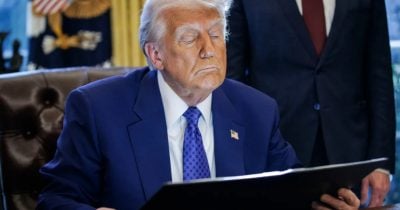ARTICLE AD
International tariffs on digital services could reshape taxation policies affecting global crypto operations.

Photo: Samuel Corum
Key Takeaways
President Trump is directing trade remedies against digital services taxes impacting US tech companies. The digital tax memo may affect crypto firms by introducing new compliance challenges and tariffs. <?xml encoding="UTF-8"?>Today, President Donald Trump is preparing to sign a memorandum directing the US Trade Representative to develop trade remedies against foreign digital services taxes that target US tech companies, including Alphabet and Meta Platforms, reported Bloomberg this morning.
The initiative addresses digital service taxes implemented by roughly 30 countries, including France, the UK, and Canada, which the US considers discriminatory.
While the memorandum doesn’t specify exact tariffs or timelines, it suggests potential retaliatory measures that could affect US-based firms operating internationally, including those in the crypto sector.
The action follows earlier US investigations into digital service taxes, including a 2019 USTR investigation that determined these taxes disproportionately impact American companies.
Trump’s administration had previously launched probes into the digital tax systems of France, Italy, Spain, and other nations, arguing these policies were harmful to US businesses.
With Canada having implemented its digital service tax in July 2024 and other nations either maintaining or developing similar measures, the US response could trigger broader global trade and tax disputes.
These disputes could potentially affect blockchain companies and crypto exchanges that operate internationally.
The evolving regulations around digital service taxes may lead to increased scrutiny and tax obligations for crypto businesses.
Companies operating across borders could face new compliance challenges as governments align their tax systems with global standards or implement new tariffs on digital transactions.
These additional expenses can deter market expansion or force exchanges to transfer costs to users, potentially reducing trading activity.
Previous trade policies have already impacted the crypto sector.
As of February 1, announcements by President Donald Trump to impose tariffs on imports from Mexico, Canada, and Europe triggered a wave of liquidations in the cryptocurrency market.
On February 3, the crypto market experienced its largest liquidation event of the year, with over $2 billion wiped out from leveraged positions in just 24 hours.
Disclaimer
 17 hours ago
14
17 hours ago
14 




